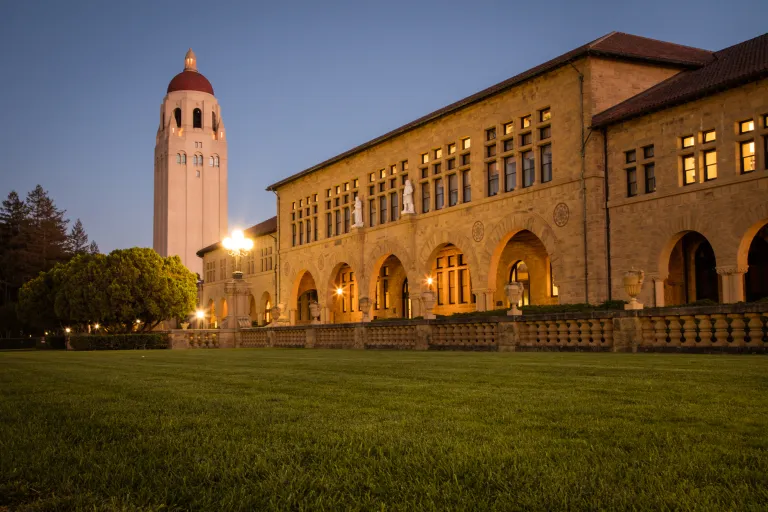Thomas Ehrlich is an adjunct professor in the Stanford Graduate School of Education.
“It Can’t Happen Here,” published in 1935, soon after Hitler became German Chancellor, is the story of a ruthless dictator elected president of the United States on a platform of traditional American values, as well as dramatic social and economic reforms. He quickly seizes all the levers of governmental power, supported by his own paramilitary forces. The novel was written by Sinclair Lewis, the first American to win the Nobel Prize for literature. At the time, it was considered dystopian fantasy. But as Hitler quickly took total control of the German government, the book became a wake-up call to protect American democracy.
Today, Ukrainian President Zelensky is giving a wake-up call for nations around the world to protect their democracies and is a role model for defending the freedoms that democracy affords. But unlike Ukraine, American democracy does not face its danger from another nation. Our democracy is at risk from within.
Abraham Lincoln predicted this phenomenon could happen in an 1838 speech when he said, “if destruction be our lot, we must ourselves be its author and finisher. As a nation of freemen, we must live through all time, or die by suicide.”
On January 6, 2021, an insurrection sought to overthrow our democracy, followed by 147 members of Congress voting to overturn the results of the presidential election. Our democracy escaped destruction, but it was a very close call. It is up to us — all of us — not to let our democracy die by suicide. I wish this were hyperbole, but it is not.
What can each of us do? It is tempting to think, “Not much: I am just one American — how could I help save our democracy?” But there is much we can do. And if we don’t, it is certain that the level of destruction will increase.
Our democracy is fragile and in critical need of strengthening in four key arenas:
- First, protecting the right to vote.
- Second, stopping gerrymandering of Congressional districts.
- Third, limiting the influence of money in political campaigns.
- And fourth, reversing the political polarization that has crippled the abilities of our country and many states to adopt sound public policies supported by the majority of voters.
I encourage you to look at those four clusters of issues in terms of what is actually happening — or not happening — in your own state. It may be tempting to focus just on the national scene, and that scene is important. But most of the action in these arenas is happening in states, just as was true when the Supreme Court recognized the right of gay and lesbian couples to marry: two-thirds of the states had already done so. Pick an issue and find a way to help.
It should be easy to vote. But the sad reality is that it has become much harder in many states. In Texas, for example, legislation passed last year bans counties from allowing 24-hour voting, prohibits drive-through voting, makes it much tougher to vote by mail and imposes other severe restrictions on the right to vote. Florida, Georgia and other states have adopted similar limitations.
You can volunteer your time, your money or both for an organization to help defeat such restrictions before they are adopted by your state and reverse them when they are already law. Rock the Vote, a leader in the fight against voter suppression, has many ways to help.
Gerrymandering has warped our elections and deprived millions of a fair say in who will represent them. Parties in power can ensure they stay in power by strategically drawing the lines of Congressional districts. Nonpartisan state commissions are an effective way to preclude such partisan action, and seven states have adopted this approach. Consider volunteering for All On the Line, one of the organizations pushing to eliminate gerrymandering.
Common Cause is a national organization working to control the dangerous impact of money in campaigning. Unlimited money spent on elections has a corrupting influence. Common Cause was founded by John W. Gardner, a Stanford graduate and trustee, and a Republican who served in the Democratic administration of Lyndon B. Johnson. Make calls, write postcards and help get out the vote.
Political polarization is crippling our country’s ability to adopt needed public policies. One corrective would be a move to ranked-choice voting, already adopted in Maine, Alaska and some cities. This reform can check the power of a vocal minority to win elections over a moderate minority. The current winner-take-all approach is biased toward the extremes in both parties. Ranked voting does the opposite. Fairvote.org is dedicated to promoting ranked voting; ask how you can help.
With freedom comes responsibility. As has been frequently said, “democracy is not a spectator sport.” We all have both opportunities and obligations to engage in protecting and strengthening our democracy.
My college Professor Samuel Huntington concluded one of his books with these words: “Critics say that America is a lie because its reality falls so short of its ideals. They are wrong. America is not a lie; it is a disappointment. But it can be a disappointment only because it is also a hope.”
There is hope for our democracy. But only if each of us is an active participant.
